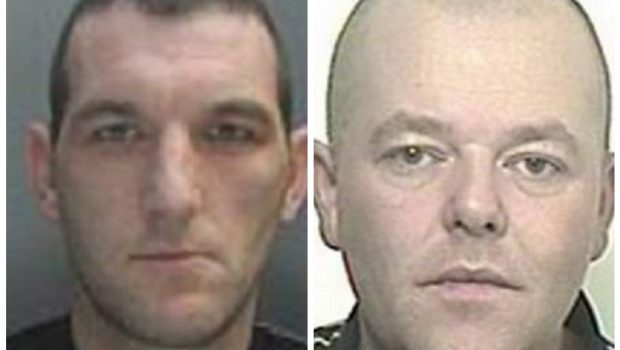Two men who blew up cash machines in a spree across the north-east have had their jail sentences slashed.
Joseph McHale and Kevin Schruyers were part of a gang which stole £130,000 during a series of raids in Aberdeen, Inverurie, Oldmeldrum and New Deer.
Ryder Cup hero and former Open champion Paul Lawrie’s golf shop at Blair’s was also raided, with the culprits taking just three minutes to pile £30,000 of stock into their waiting car.
Soon afterwards, McHale and Schruyers were observed at a flat in Torry with a large bag and clothing, and wearing golfing apparel.
Last year, McHale was jailed for 12 years while Schruyers was locked up for 13.
The “ringleader” of the gang, Robin Vaughan, pleaded guilty to his part in the raids during the trial at the High Court in Edinburgh last year.
But McHale and Schruyers, both of Liverpool, lodged appeals against their sentence – arguing their trial was prejudiced after the jury found out they were associated with Vaughan.
And at the Court of Criminal Appeal in Edinburgh, they had their sentences almost halved.
Lord Justice General, Lord Carloway, has reduced McHale’s sentence to eight-and-a-half years and Schruyers’ to eight years.
Despite being career criminals, the appeal court accepted 38-year-old McHale and Schruyers, 43, were acting as lackeys during the spree.
The pair, along with Vaughan and Peter O’Brien – who was dealt with separately after going on the run – carried out the crimes across two months in late 2013.
The gang first struck that September, unsuccessfully targeting bank machines at Inverurie and Oldmeldrum.
But they had more luck in New Deer – where they made off with more than £21,000 after exploding an ATM.
Just a day later, they struck for a fourth time at the Scotmid store in Bieldside and stole more than £110,000.
In total, there were nine attempted heists between September and mid-November, with Ellon, Stonehaven, Mintlaw and Bucksburn cash machines also targeted.
During the trial, last May, Vaughan admitted his part in the Bieldside and New Deer thefts and the attempt in Mintlaw.
His co-accused were later convicted, but only of the unsuccessful attempts.
In his judgement, Lord Carloway said: “They targeted small Aberdeenshire towns in the hours of darkness, placing tape over any cameras, using crowbars to break into the premises and introducing gas and wiring into the ATMs with a view to blowing them up and stealing the money inside.
“The modus operandi required a degree of expertise to improvise a hot wire ignition system, the wires being heated by a battery and attached to matches.”
A white Audi was stolen from outside a gym in Aberdeen and used as a getaway car during the failed raid on the Bank of Scotland in Inverurie.
It was later recovered by police in woods near Methlick, with gas cylinders, a battery with leads attached to matches, a sledgehammer and a pair of gloves in the back.
Schruyers’ DNA was matched to DNA recovered from the Audi’s steering wheel.
And McHale’s DNA was found on a tape surrounding an explosive device recovered from the Lloyds TSB building in Bucksburn.
But despite the damning evidence against them, the pair maintained their trial was prejudiced by Vaughan’s admission of guilt.
They argued to the disclosure of his past convictions tied them to a known criminal.
Members of the jury were asked to “put that information aside and have no regard to it”, at the time though.
And Lord Carloway agreed that the men’s right to a fair trial had not been affected.
He wrote: “Disclosure of a co-accused’s convictions can hardly be regarded as a breach of the rights of another accused.
“It is not a fact which inevitably leads an unfair trial by disabling the jury from reaching an impartial verdict.”
However, he deemed that the men’s sentences should be reduced because they were only convicted of the unsuccessful raids, and it had been accepted that Vaughan was “the ringleader”.
Lord Carloway stated: “In all these circumstances, the court will reduce the sentences.”
